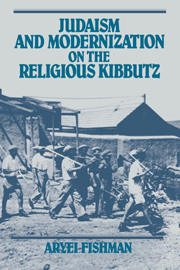Book contents
- Frontmatter
- Contents
- Preface
- Introduction
- PART ONE PROLOGUE
- PART TWO THE PARENT ORTHODOX MODERNIZING MOVEMENTS
- PART THREE THE RELIGIOUS KIBBUTZ MOVEMENT
- 4 The foundations of the Religious Kibbutz Movement
- 5 Charisma and rationalization
- 6 The halakhic–socialist collective
- 7 The confrontation between halakhah and external reality
- 8 Between heteronomous and autonomous authority
- Afterword
- Appendix A The Religious Kibbutz Federation settlements
- Appendix B About the religious kibbutz members quoted in this book
- Appendix C Ideological periodicals referred to in book
- Notes
- Index
6 - The halakhic–socialist collective
Published online by Cambridge University Press: 29 October 2009
- Frontmatter
- Contents
- Preface
- Introduction
- PART ONE PROLOGUE
- PART TWO THE PARENT ORTHODOX MODERNIZING MOVEMENTS
- PART THREE THE RELIGIOUS KIBBUTZ MOVEMENT
- 4 The foundations of the Religious Kibbutz Movement
- 5 Charisma and rationalization
- 6 The halakhic–socialist collective
- 7 The confrontation between halakhah and external reality
- 8 Between heteronomous and autonomous authority
- Afterword
- Appendix A The Religious Kibbutz Federation settlements
- Appendix B About the religious kibbutz members quoted in this book
- Appendix C Ideological periodicals referred to in book
- Notes
- Index
Summary
In this chapter I shall consider the rationalization of Judaism in the Religious Kibbutz Federation in terms of the value-orientations embedded within its world-transformative ethos. The religious kibbutz community saw itself as a social instrument acting in history, not only on the national level but also as a halakhic–socialist community designed to take part in perfecting the world.
The fact that many members of the Religious Kibbutz Federation were raised on Torah-im-Derekh Eretz as the religious culture of German Orthodox Jewry indicates the possibility of an immediate influence exerted by this culture on the RKF's religious worldview and the character structure of its members. Indeed, the religious value-orientations that co-ordinate with those of modernization – orientations that received unequivocal expression in Torah-im-Derekh Eretz – were similarly manifest in the religious kibbutz. The religious ethos of world transformation that was cultivated by Torah-im-Derekh Eretz, expressed in the urge to improve creation through scientific, and specifically halakhic, law, comes clearly through in the following description of the worldview of Gedaliah Unna, one of the early spiritual leaders of the RKF:
Torah treats the world's soul, while science treats the world's body. Both spheres are important for the problems confronting us in our difficult path through life … Through the study of Torah and observance of the mitzvot man frees himself from bondage to the physical world, learns to control it and render it sacred, as a means of divine worship … to perfect the world and its fullness in the Kingdom of God.
- Type
- Chapter
- Information
- Judaism and Modernization on the Religious Kibbutz , pp. 101 - 114Publisher: Cambridge University PressPrint publication year: 1992



